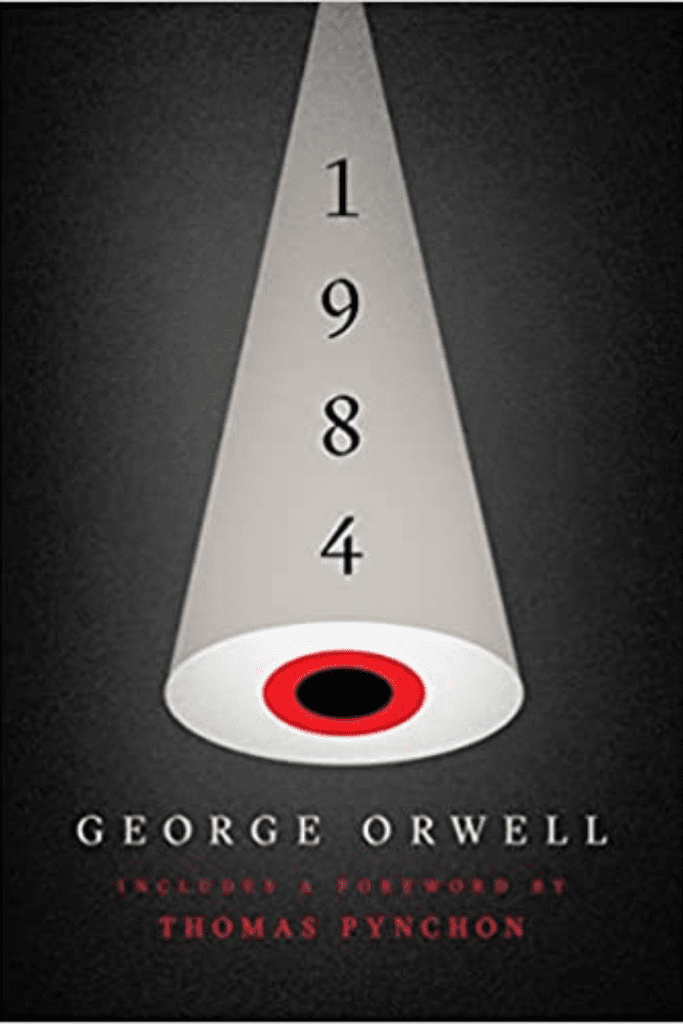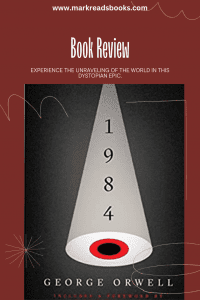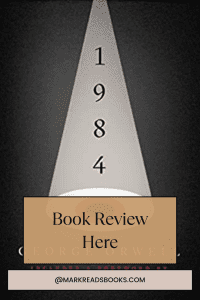1984 by George Orwell is a novel is not only a powerful work of fiction but also a profound exploration of the darker sides of human nature and society.

| Title | 1984 |
| Writer | George Orwell |
| Publisher | Secker & Warburg |
| Publication date | 8th June 1949 |
| MBR star rating /5 | ⭐⭐⭐⭐⭐ |
| Genre | Literary Fiction Dystopian Fiction |
fact sheet
Tags

Synopsis: 1984,
George Orwell’s ground-breaking dystopian novel, remains a timeless masterpiece that resonates with readers today more than ever. Set in a world where oppressive regimes dominate every aspect of life, 1984 introduces us to a terrifying society ruled by perpetual surveillance, mind control, and the systematic erasure of truth. Orwell’s chilling narrative exposes the dangers of authoritarianism and explores the psychological consequences of living in a world where individuality is crushed and dissent is punished.
The novel centers around Winston Smith, a low-ranking member of the Party in the totalitarian state of Oceania. In this bleak world, the Party, led by the omnipresent and omniscient Big Brother, controls every facet of existence. The government enforces its power through a pervasive surveillance network, Thought Police, and relentless propaganda that rewrites history, all designed to crush rebellion and maintain absolute control over its citizens. Concepts like “war is peace,” “freedom is slavery,” and “ignorance is strength” are the twisted slogans that underpin this society, creating a reality where doublethink—the acceptance of two contradictory beliefs—is a necessity for survival.
Winston, a quietly rebellious man, secretly detests the Party and dreams of resistance. He begins to pursue a dangerous and illicit love affair with Julia, a fellow Party member, in a world where even the most private emotions are monitored and policed. Together, they struggle to reclaim their humanity, their personal freedom, and their right to feel and think freely. Their brief moments of defiance serve as a stark contrast to the pervasive sense of fear and hopelessness that envelops their world. Yet, as they discover, resisting the Party is not as simple as breaking the rules—the Party’s power extends into the very minds of its citizens.
Through Winston’s story, Orwell explores the terrifying consequences of unchecked power: a world where the state controls not only information but also individual thought, memory, and reality itself. As Winston confronts the brutal tactics of the Party—torture, manipulation, and forced re-education—1984 forces readers to ask difficult questions about truth, freedom, and the lengths to which governments might go to maintain control.
Review of 1984 by George Orwell
A Timeless Exploration of Power, Control, and Individual Freedom
George Orwell’s 1984 is one of the most iconic and enduring novels of the 20th century, often cited, referenced, and quoted even by those who have never read it. Its influence on modern culture is undeniable, and its themes of surveillance, censorship, and the manipulation of truth have only grown more relevant with time. Despite being nearly 80 years old, 1984 remains a cornerstone of dystopian literature and a chilling reflection of the dangers of unchecked power—whether wielded by governments or corporations.
One of the most well-known elements of the novel is the phrase “Big Brother is watching you,” which has become synonymous with invasive surveillance and the loss of privacy. In modern society, where advancements in technology allow for unprecedented levels of data collection, Orwell’s warnings about constant monitoring feel more prophetic than ever. While Orwell envisioned a totalitarian regime using these tools to control its citizens, today, the specter of surveillance often extends to corporations seeking to profit from tracking consumers’ habits. This shift from state-driven control to corporate data collection adds a new layer of complexity to Orwell’s warnings, proving that the novel’s relevance transcends its original context.
When reading 1984, many come with preconceived notions shaped by popular culture. The novel is often reduced to its most famous line—”Big Brother is watching you”—but it offers so much more. It explores the erosion of individual thought, the manipulation of language, and the obliteration of historical truth, all of which contribute to a society where freedom, in every sense of the word, is crushed under the weight of authoritarian rule.
For those who lived through 1984—the actual year—there was a certain hype and curiosity about whether Orwell’s predictions would come true. The world at that time was on the brink of technological innovation, and though the advances were nowhere near what they are today, there was a sense that Orwell’s cautionary tale was coming to life. In some ways, Orwell’s future has materialized, but in more subtle, insidious ways, with corporate surveillance replacing the overt governmental control Orwell feared. Today, our personal data, online habits, and even our social interactions can be commodified, tracked, and used for profit, a reality that might surprise Orwell but certainly aligns with his central message.
The structure of 1984 is divided into three key parts, each of which plays a vital role in Orwell’s message. The first part introduces us to Winston Smith, a man living under the totalitarian regime of the Party, where he works as a bureaucrat whose job is to rewrite history. This section is particularly compelling in its depiction of how totalitarian governments can control the past to shape the future, erasing inconvenient truths and fabricating an unassailable narrative. What was a profound warning in 1949 has become eerily familiar in today’s world, where misinformation and historical revisionism are prevalent.
The second part of the novel, which details Winston’s relationship with Julia, has often been criticized for lacking depth, and the chemistry between the two characters can feel forced. Some readers may struggle to see why this relationship unfolds as it does, though it serves an important narrative purpose. It highlights the human need for rebellion, connection, and intimacy in a world where such desires are systematically repressed. While the relationship may not resonate as strongly as other elements of the story, it serves to show how even personal relationships are affected by the state’s control.
The final section of 1984 is perhaps the most powerful, where Winston’s rebellion is crushed, and the full force of the Party’s psychological manipulation is revealed. The harrowing scenes of torture and re-education are written with chilling precision, capturing Orwell’s vision of a world where not only physical rebellion but even thought itself is policed. This part of the novel leaves a lasting impact, as Orwell’s message about the fragility of truth and the ease with which people can be broken is driven home with brutal clarity.

What makes 1984 such a compelling read is its ability to resonate with readers in different ways, depending on the context in which they encounter it. For some, it is a cautionary tale about government overreach and the dangers of surveillance. For others, it is a profound exploration of the human spirit’s capacity for resistance and the devastating consequences when that spirit is crushed. The novel’s themes of power, control, and individual freedom are universal, making it a timeless work that speaks to different generations in new ways.
In today’s world, where issues of privacy, truth, and control are more contested than ever, 1984 serves as a crucial reminder of the dangers of complacency. Orwell’s ability to craft a story that transcends its time is what makes 1984 not only a classic but a necessary read. The novel continues to be used—often outside its original context—to make points about the overreach of technology, government, or corporate power, proving that its message remains as potent today as it was nearly 80 years ago.
Conclusion
Ultimately, 1984 is a novel that every reader should experience. It is not only a powerful work of fiction but also a profound exploration of the darker sides of human nature and society. Whether you read it as a warning or a reflection, 1984 challenges us to think critically about the world we live in and the forces that shape our perception of reality.
Meet : George Orwell

Eric Arthur Blair, better known by his pen name George Orwell, was an English author and journalist. His work is marked by keen intelligence and wit, a profound awareness of social injustice, an intense opposition to totalitarianism, a passion for clarity in language, and a belief in democratic socialism.
In addition to his literary career Orwell served as a police officer with the Indian Imperial Police in Burma from 1922-1927 and fought with the Republicans in the Spanish Civil War from 1936-1937. Orwell was severely wounded when he was shot through his throat. Later the organization that he had joined when he joined the Republican cause, The Workers Party of Marxist Unification (POUM), was painted by the pro-Soviet Communists as a Trotskyist organization (Trotsky was Joseph Stalin’s enemy) and disbanded. Orwell and his wife were accused of “rabid Trotskyism” and tried in absentia in Barcelona, along with other leaders of the POUM, in 1938. However by then they had escaped from Spain and returned to England.

If you would like to see some more Insightful Book Reviews check here or to add 1984 by George Orwell TBR
Like follow or share if you would want similar content.
Above all Keep Safe and treat people fairly.
Mark.